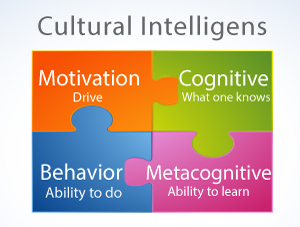ASC articles
Cultural Intelligence drives adjustment, work performance and mental well-being when abroad 11. January 2016Numerous studies have shown that cultural intelligence is associated with a range of positive issues for expatriates. They integrate and adjust better to local working conditions and perform better. With improved adjustment, follows improved a higher mental well-being, a result of lower levels of stress and less uncertainty when interacting with the local culture. Unsurprisingly, this also increases the expatriate’s satisfaction with the assignment. 
The benefits extend when working in multi-cultural teams: when team members possess cultural intelligence, there is less friction and higher levels of cohesiveness between team members. The benefits extend to an increased ability to draw on the diverse competences and knowledge of fellow team members, and more ideas are shared, resulting in cross-pollination of ideas; often a requirement when working on finding a creative solution. Related to this: on an individual level, people with high levels of cultural intelligence also tend to have a wider network on which they draw on for advice in a professional setting. These are only a selection of the benefits that are identified, for a more complete list, please see below*
What is Cultural Intelligence?
Cultural intelligence (CQ) is made up of four factors:
Metacognitive CQ refers to how aware you are about cultural aspects in a cross-cultural situation; and the extent you develop ways to analyze and understand what is happening, and adjust your perceptions. A key component is the ability to question your own cultural assumptions and adjust your knowledge to the new input.
In short: the ability to learn.
Cognitive CQ is how much you know about norms, practices and conventions in the country you are visiting; both with regards to what is the same and that which is different. Examples include attitude to time, authority and what is expected from relationships.
In short: what you know.
Motivational CQ is the amount of ability, energy and interest you have to focus on cross cultural issues; this is a critical factor as it is what drives the interest and engagement necessary for the other three factors.
In short: the desire to learn and act.
Behavioral CQ: While the first three factors are mental abilities that allow you to know what is the suitable way to act, the behavior factor relates to the extent you are willing and able to act in the appropriate way. One component is having a certain level of flexible language skills, so that you can change the way you communicate a given message. To read more about this factor, read the article on Cultural Dexterity (Molinsky 2007)
In short: the ability to act.
Cultural intelligence can be developed
As is evident from the four factors above, it is possible to practice and improve your ability in each of them; such as practicing using frameworks for how to think about cultural encounters to improve the metacognitive and learning about the destination to improve the cognitive. By understanding the possibilities and benefits of better cultural understanding will increase the motivational factor, and finally, with the right attitude and practice in how to use the knowledge, and adapt behavior to perform in a cultural setting.
The greatest increase in cultural intelligence is for those who relocate the first time to a foreign country, while subsequent moves will continue to develop the skill, as will working in multi-cultural teams. However, the most important determinant is how much one engages with locals; the more one works and interacts, the greater the learning.
The ASC courses covers each of these four competencies, showing how to put them to use and develop cultural intelligence as a capability.
*OUTCOMES PREDICTED BY THE CULTURAL INTELLIGENCE SCALE
Individual Outcomes
Psychological
- Intercultural and psychological adjustment
- Work adjustment
- Psychological well-being
- (Lower) Culture shock
- (Less) Emotional exhaustion
- Expatriates’ intention to complete assignment
- Satisfaction with expatriate assignment
- Expectations about goals of culturally diverse interaction partners
Behavioral
- Frequency and likelihood of idea sharing with culturally different others
- Development of social networks for international students
- Heterophily of social networks within a multinational corporation
- Intercultural cooperation
Performance
- Task and contextual performance
- Leader performance in culturally diverse teams
- International leadership potential
- Cross-border leadership effectiveness
Group outcomes
Psychological
- Affect-based trust in culturally diverse dyads
- Team cohesion in multicultural teams
Behavioral
- Information integration behaviors and cooperative relationship management behaviors in intercultural negotiation pairs
- Fusion teamwork in multicultural teams
Performance
- Joint profits of intercultural negotiation pairs
- Creativity performance of intercultural dyads
- Team creativity in multicultural teams
- Team performance of multicultural teams
For a full list references and a summary, please see:
Leung, Kwok, Soon Ang, and Mei Ling Tan. "Intercultural competence."Annu. Rev. Organ. Psychol. Organ. Behav. 1, no. 1 (2014): 489-519.
|
